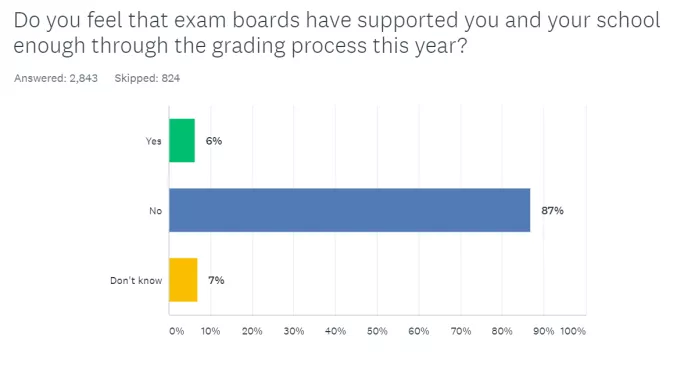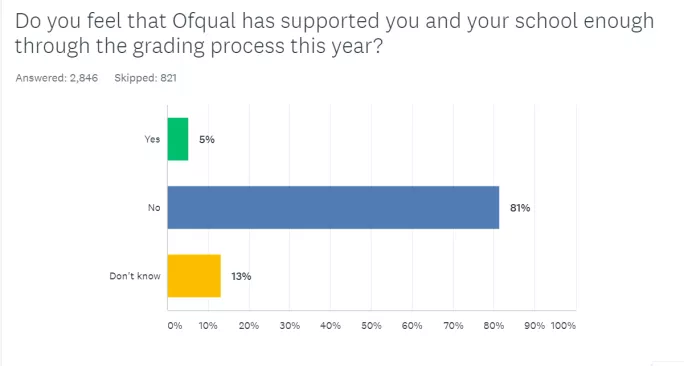87% of teachers lacked GCSE and A-level grade aid

Nearly 9 in 10 teachers have said exam boards did not support them or their school enough through the GCSE and A level grading process this year.
In an exclusive Tes survey of over 2,800 grading teachers, 87 per cent said exam boards had not given enough support.

And more than 8 in 10 teachers surveyed - 81 per cent - said that exams regulator Ofqual had not provided enough support throughout the process, either.

Teachers commented that schools were burdened with most of the workload usually carried out by exam boards this year.
A state deputy head grading GCSE science said: “The key information has come from JCQ and Ofqual - and we have created our policy based on that. There has been some guidance from exam boards - largely subject-specific.
“One could reasonably question what the exam boards are doing to justify the exam entry fees this year: the work is falling to the schools and the fees remain the same.”
And a secondary English teacher said: “We were given screenshots of past papers and they were released too late, causing additional stress. Real help would have been paying examiners to do the marking.”
A state science head of department said: “I suspect they [the boards] didn’t have guidance early enough.
“But their guidance and support came too late for us to actually be able to use any of it. And the decision to publish the exam questions was crazy - that might work for an essay based subject but for science I don’t see how on earth that could be sensible.”
An English head of department in the state sector said: “I feel the exam boards should have sent a representative into schools to work closely with them and have a look at what’s going on.
“Also, they should have given a clear indication of a paper to do for each area, released on a set day - exam style, to avoid any discrepancies in the way schools deliver provision. I work closely with teachers in other schools and I know the playing field isn’t level,” they added.
Many teachers surveyed also commented that the guidance released by Ofqual was vague or unclear.
An English head of department in the state sector commented on ”[Ofqual’s] announcements made on blogs, information drip-fed and far too late to be useful”.
And a deputy head grading English said: “While it was ‘nice’ to get lots of documents from them to read, there was often no time to read them (or to attend the webinars) and what was contained within the documents was, again, vague.
“The document of what each grade boundary should look like is a perfect example of this: Grade 6 and 8 are described but grade 7 and 9 are simply “above the expectation for the lower grade”,” they added.
And some said that the changing nature of guidance meant they felt they appeared unprofessional when advising students and parents.
A science teacher in the private sector said: “Too much of the information came too late. The final documents released in April was too late to properly prepare the children.
“This caused massive stress to children, parents and teachers. It made us look unprofessional with the numbers of times we had to say that we were not sure how things would work or change assessments as the updated information had changed drastically from what had been initially implied.”
However, some teachers said that Ofqual’s “hands were tied” because they had to wait for government decisions on exams from the DfE.
“They were on the back foot from the beginning of the year as they were as surprised with announcements as the profession was; they’ve done their best but a lack of leadership and communication from the DfE, and most notably, the SoS [secretary of state, Gavin Williamson], their hands have been pretty much tied and they have had to be more reactive than would have been expected,” a headteacher in the state sector commented.
But others said that the fact there was still no guidance on appeals showed that Ofqual had not supported schools enough, with one teacher adding, “it feels like Ofqual has never worked in a school”.
Geoff Barton, general secretary of the Association of School and College Leaders said: “This finding reflects a widespread feeling that schools and colleges were left to shoulder the burden of the grading process and that the role of the exam boards and Ofqual has been minimal.
“Ofqual and the exam boards have provided some guidance and materials to support the process. However, it has all been rushed and late - largely because of the government’s failure to plan for this contingency - and the heavy lifting has been done by school and college leaders and teachers.
“This is why it is now so important that this is recognised by the exam boards over the issue of exam fees and that they give back a significant rebate. Our recent survey showed that a majority of school and colleges leaders feel that the rebate should be at least 75 per cent.”
A spokesperson for JCQ said: “JCQ and the exam boards recognise the challenges and tremendous pressure schools and colleges have faced due to the pandemic, and the impact this has had on teaching and learning.
“We have supported teachers as much as possible while working to implement Ofqual and the DfE’s requirements for the summer series, and to minimise additional burden for schools and colleges as much as possible.
“We shall continue to support schools, colleges and students during results week and beyond.”
A spokesperson for Ofqual said: “Teachers deserve praise and gratitude for their extraordinary work in unprecedented times.
“Their work has enabled assessments to take place and grades will be issued despite disruption due to the pandemic. Students will progress to the next stage of their lives.
“Since the government cancelled exams in January, we have published guidance to teachers and, alongside many partner organisations, sought to support them through the arrangements for teacher-assessed grades (TAGs).
“Those arrangements followed a public consultation that attracted more than 100,000 responses, including from teachers, students and parents.”
You need a Tes subscription to read this article
Subscribe now to read this article and get other subscriber-only content:
- Unlimited access to all Tes magazine content
- Exclusive subscriber-only stories
- Award-winning email newsletters
Already a subscriber? Log in
You need a subscription to read this article
Subscribe now to read this article and get other subscriber-only content, including:
- Unlimited access to all Tes magazine content
- Exclusive subscriber-only stories
- Award-winning email newsletters
topics in this article



